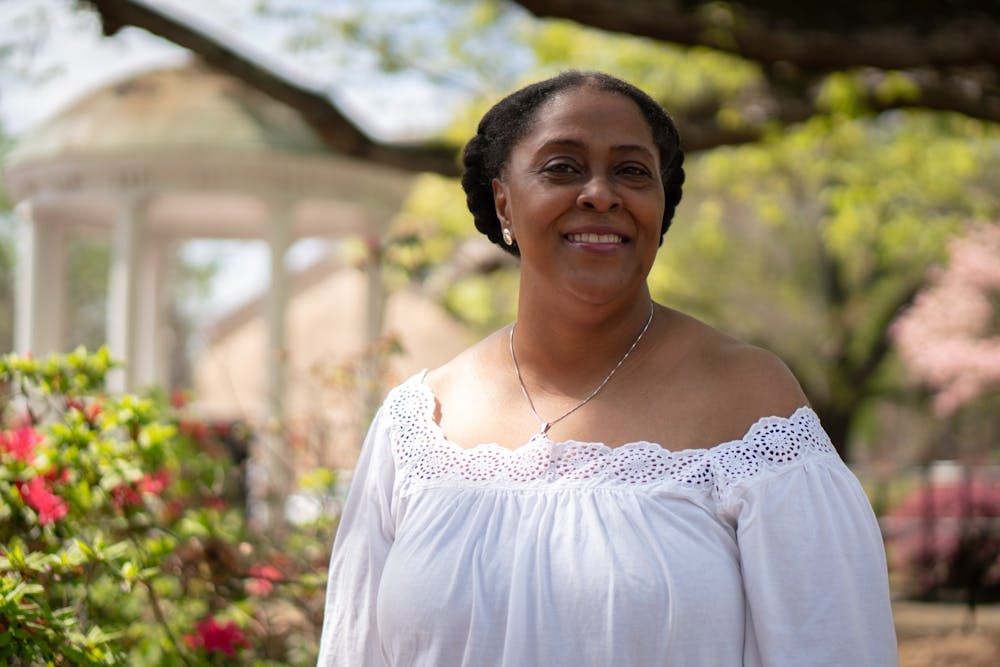Mason-Hogans said her family is closely tied to the history of civil rights and the Black community in Chapel Hill, which contributed to her desire to create this project.
Her mother, Patricia Mason, was one of the first Black admissions counselors at UNC, and her father's actions during the civil rights movement inspired demonstrations and activism in Chapel Hill.
Mason-Hogans said her ancestors were enslaved at the University — and some are buried on what is now UNC’s Finley Golf Course.
Growing up around local heroes like her father, Mason-Hogans said, she felt that the narrative of Chapel Hill and UNC civil rights history was centered only on the University rather than local Black voices.
“I knew that much of what had been written about the civil rights history in Chapel Hill was incomplete,” she said.
While serving as a program manager at Duke University's Center for Documentary Studies for the Critical Oral Histories Component, Mason-Hogans said she helped adapt the techniques of critical oral history for research on civil rights.
Mason-Hogans said critical oral history is a historical research method developed at Brown University to explore the stories of marginalized communities. She added that such communities often do not have the resources to get their history recognized.
"Young Black people from marginalized communities don't often get to tell their story in the way that they should," she said.
Other local roles
In addition to her work as a historian, Mason-Hogans is also an active community member. She currently sits on the University Commission on History, Race and a Way Forward.
“Danita’s a little bit of everywhere, doing a little bit of everything,” Chapel Hill native Alethea Alston, a friend of Mason-Hogans, said.
A veteran Chapel Hill-Carrboro City Schools teacher, Alston said she has known Mason-Hogans since childhood.
To get the day's news and headlines in your inbox each morning, sign up for our email newsletters.
Together, Alston said, they have lobbied to name a building on UNC's campus after Cates, a Chapel Hill resident and UNC employee who was murdered in the Pit by white supremacists in 1970.
Mason-Hogans said she is also deeply involved in local education efforts.
Alston said she and Mason-Hogans have also petitioned for UNC to provide free education to descendants of those who were enslaved by the University.
Today, CHCCS has one of the largest achievement gaps between white and Black students in the country — a disparity that has persisted for years.
When Mason-Hogans returned to Chapel Hill from college at N.C. A&T University, she founded an after-school program for underachieving students to address this problem.
“A number of my students were failing when they entered into my program, and all came up with As and Bs,” she said.
She is also the president and founder of Bridging the Gap, a nonprofit dedicated to education enrichment for descendants of those who were enslaved at UNC.
'The Invisible Town'
The OHA, which will provide funding and mentoring to Mason-Hogans, is a leading professional society for the practice of oral history as a research method.
“We are the organization that sets professional standards and best practices,” Louis M. Kyriakoudes, co-executive director of the OHA, said.
Kyriakoudes said Mason-Hogans' grant is intended to cover living expenses for the full year, with a smaller stipend for research-specific resources.
“We think that Mason-Hogans is doing the thing that oral history does best, which is to recover and preserve those stories that have been overlooked,” he said.
Kyriakoudes said only 10 percent of the pool of applicants received funding — and Mason-Hogans’ project proposal was one of 11 chosen by the OHA for a one-year full-time fellowship. Funding came through the National Endowment for the Humanities’ allocation from the American Rescue Plan, the 2021 pandemic relief bill.
“In Chapel Hill, everybody knows the greatness of UNC and all of the great thinkers that came out of UNC,” Mason-Hogans said. “But so little is known about the community and families like mine who have labored and served UNC since its inception.”
The yearlong fellowship will end on May 31, 2023.
@DTHCityState
city@dailytarheel.com | elevate@dailytarheel.com




